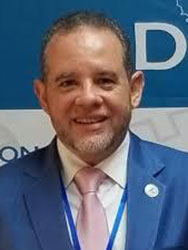Former Fogarty HIV trainee helps lead Dominican Republic's COVID response
July / August 2020 | Volume 19, Number 4
Q and A with William Duke, M.D., MPH

William Duke, M.D., MPH
Dr. William Duke, a physician and epidemiologist, is dean of health sciences and epidemiology at the Universidad Nacional Pedro Henriquez Urena (UNPHU) in the Dominican Republic. Early in his career, he received infectious disease research training through a Fogarty grant to the University of California, Berkeley. Since then, Duke has served as a scientific advisor to the Dominican Government’s Ministry of Public Health and provided leadership for PEPFAR-supported HIV/AIDS projects. He earned his black belt in Jujitsu and is a certified chief medical officer for Paralympic Sport. Recently, Duke was named a member and advisor to his country’s COVID-19 Prevention and Control National Commission.
What Fogarty-funded training did you receive?
While a Fogarty trainee in 1990, I was able to improve my research skills - including use of biostatistics - and learned to critically analyze epidemiological data and publish the findings. I also designed and conducted serosurveillance research among the general population and high-risk groups. I received this training at UC Berkeley through Fogarty’s
AIDS International Training and Research Program (AITRP) under the mentorship of its principal investigator, Dr. Art Reingold, who spearheaded their Center for AIDS Prevention Studies (CAPS) program there. I was representing the Dominican Republic as part of a consortium of Latin- American health ministries with the goal of improving my nation’s HIV/AIDS National Program.
How did that experience impact your career?
My mentor Dr. Reingold influenced me in my decision to continue with an academic focus on HIV, in addition to tuberculosis. I recognize now, after nearly three decades in this field, that without Fogarty I would never have achieved my current professional life and career successes.
For these reasons, I must express my deepest gratitude to Dr. Reingold. The San Francisco HIV/AIDS Program and the UC Berkeley program were also instrumental during my Fogarty fellowship because they provided unique opportunities. I gained a great deal by collaborating with other trainees, conducting community epidemiology surveys, updating interventions for the San Francisco region, working with NGOs on HIV/AIDS prevention and control, and even treating patients. Each of these experiences shaped my future. Since 2009, I have served as the Coinfection TB/HIV national advisor in the Dominican Republic’s Ministry of Health.
How were you able to apply what you learned?
After my training I used my expertise to improve the research interventions in my country’s national program for HIV/AIDS/STDs, including establishing a new methodology and best practices for both the general population and high-risk populations. Having influenced the National Health Plan and the health system in this way, I spent the next 30 or so years working to save lives and mitigate risk among LGBTQ populations, pregnant women with HIV, children living with HIV, Haitian immigrants and inmates to prevent, control and treat HIV/AIDS.
How did Fogarty training prepare you for this?
Fogarty’s most significant message was the need to cooperate and influence all levels of the health system as well as all stakeholders, both national and international. Because of Fogarty, I understood I would need to integrate all existing professionals and systems if I wanted to create a new and effective model of intervention for people living with HIV. Collaboration, then, is what led to the opening of new treatment sites that provided antiretroviral therapy and follow-up medical care throughout the Dominican Republic.
How are you involved in the COVID response?
In February 2020, the Ministry of Health selected me to act as National Epidemiology Advisor and member of the COVID-19 Prevention and Control National Commission. In March, the National Health Science and Dominican School of Medicine Association asked me to provide a COVID-19 epidemiology data analysis and intervention plan and protocol for medical students during their training. The goal is to improve the control and prevention of the pandemic disease using contact tracing with COVID patients and people they have interacted with in poor provinces. Specifically, we use the “triple T” method - tracing, testing and treatment - when patients test positive for the coronavirus. During the quarantine period, we not only re-test patients and their contacts, we also provide training in physical distancing and psychological support for a population of 500,000 people.
More Information
To view Adobe PDF files,
download current, free accessible plug-ins from Adobe's website.